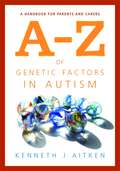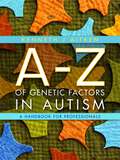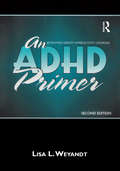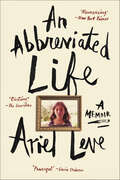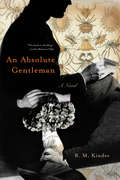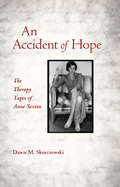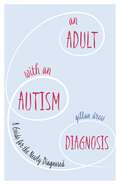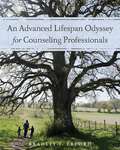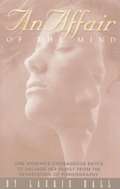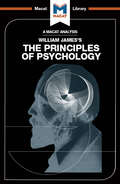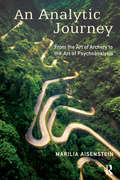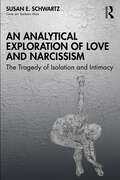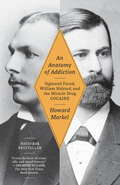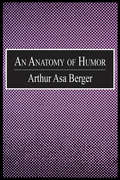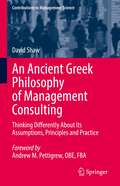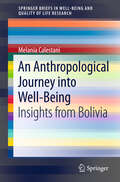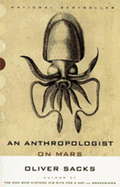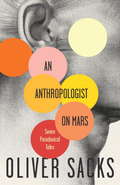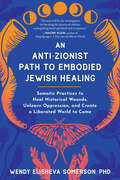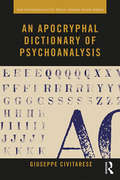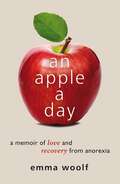- Table View
- List View
An A-Z of Genetic Factors in Autism
by Kenneth J. AitkenThe concept of a single condition known as 'autism' is quickly becoming outdated, and is now understood to be an umbrella term for a variety of predominantly genetic conditions. This can be confusing for parents of children who have been diagnosed as having an 'autism spectrum disorder'. An A-Z of Genetic Factors in Autism provides parents with a complete overview of the main genetic disorders associated with autism, including those linked to growth differences, cardiovascular issues, neurodevelopmental problems, immune dysfunction, gastrointestinal disturbances and epilepsy. Kenneth Aitken demystifies the umbrella term 'autism' by alphabetically listing these conditions along with information about how common they are, their causes, signs, and symptoms, and for many, appropriate methods of treatment and management. Information on support groups and sources of further information are also included to help parents obtain any additional support they need, and keep up to date with new developments in research and practice. This is a must-have book for any parent or carer who feels confused by their child's diagnosis, or who seeks a better understanding of the many genetic conditions linked to autism.
An A-Z of Genetic Factors in Autism: A Handbook for Professionals
by Kenneth AitkenOur understanding of the biological bases to the autistic spectrum disorders (ASDs) is advancing rapidly. Over 80 genetic conditions have now been reported in people who have also been diagnosed with ASDs. Many of these conditions have specific implications for the presenting phenotype and for treatment, management, and intervention. If the basis to the presenting behavioural phenotype is not identified, this can result in a sub-optimal level of care, complications, or even permanent damage. Kenneth J. Aitken shows that the notion of a single condition known as 'autism' is no longer tenable, and challenges current trends in the diagnosis and management of these behaviours as a homogenous group by drawing on recent research into brain function, genetics, epidemiology and neurology. This volume explains the biology and genetics of ASD, and provides clinicians and researchers with a comprehensive summary of each genetic factor including the research that links it to ASD, diagnosis and treatment issues, and related animal models, as well as detailing relevant professional organisations and avenues for further research. An A-Z of Genetic Factors in Autism is an essential resource for a wide range of researchers, clinical professionals and students interested in autism spectrum disorders, including clinical and educational psychologists, dieticians, psychiatrists, and neurologists.
An ADHD Primer
by Lisa L. WeyandtFilled with current, practical, and useful information for professionals and individuals, this second edition of An ADHD Primer summarizes the literature concerning ADHD across the lifespan. It offers a better understanding of the disorder by addressing the potential causes of ADHD, the developmental course, and numerous treatment approaches. Author Lisa L. Weyandt delivers research-based, cutting-edge knowledge in a concise and user-friendly fashion. The book skillfully explains the scientific literature, often complex, concerning this disorder. Commonly asked questions are addressed, including: What causes ADHD? What does ADHD look like, and how can it be accurately assessed? How can ADHD be treated with and without medication? Weyandt thoroughly tackles these question and more. The text contains helpful tables and appendices, as well as numerous up-to-date resources for readers who desire additional information about the disorder. An ADHD Primer is intended for students enrolled in teacher-certification programs, graduate students enrolled in research and applied training programs, educators, counselors, nurses, psychologists, parents, and individuals with ADHD.
An Abbreviated Life: A Memoir
by Ariel Leve“Sometimes, a child is born to a parent who can’t be a parent, and, like a seedling in the shade, has to grow toward a distant sun. Ariel Leve’s spare and powerful memoir will remind us that family isn’t everything—kindness and nurturing are.” —Gloria SteinemAriel Leve grew up in Manhattan with an eccentric mother she describes as “a poet, an artist, a selfappointed troublemaker and attention seeker.” Leve learned to become her own parent, taking care of herself and her mother’s needs. There would be uncontrolled, impulsive rages followed with denial, disavowed responsibility, and then extreme outpourings of affection. How does a child learn to feel safe in this topsyturvy world of conditional love?Leve captures the chaos and lasting impact of a child’s life under siege and explores how the coping mechanisms she developed to survive later incapacitated her as an adult. There were material comforts, but no emotional safety, except for summer visits to her father’s home in South East Asia-an escape that was terminated after he attempted to gain custody. Following the death of a loving caretaker, a succession of replacements raised Leve-relationships which resulted in intense attachment and loss. It was not until decades later, when Leve moved to other side of the world, that she could begin to emancipate herself from the past. In a relationship with a man who has children, caring for them yields a clarity of what was missing.In telling her haunting story, Leve seeks to understand the effects of chronic psychological maltreatment on a child’s developing brain, and to discover how to build a life for herself that she never dreamed possible: An unabbreviated life.
An Absolute Gentleman: A Novel
by Kinder KinderA spine–chilling first novel loosely based on the author's real–life relationship with a convicted murderer, An Absolute Gentleman delves, with subtlety and tremendous psychological insight, into a serial killer's mind.Meet Arthur Bloom: charming guy, small–town English professor, struggling writer, and occasional murderer. In this beautifully articulated debut novel, R. M. Kinder brilliantly channels Arthur's voice to reveal the aberrant thought processes of a surprisingly sympathetic serial killer. Horror arises as it does in real life, in brief hints and disclosures that gradually reveal the complex nature of an all–too–human narrator.
An Accident of Hope: The Therapy Tapes of Anne Sexton
by Dawn M. SkorczewskiIn 1956, Anne Sexton was admitted into a mental hospital for post-partum depression, where she met Dr. Martin Orne, a young psychiatrist who treated her for the next eight years. In that time Sexton would blossom into a world-famous poet, best known for her "confessional" poems dealing with personal subjects not often represented in poetry at that time: mental illness, depression, suicide, sex, abortion, women's bodies, and the ordinary lives of mothers and housewives. Orne audiotaped the last three years of her therapy to facilitate her ability to remember their sessions. The final six months of these tapes are the focus of this book. In An Accident of Hope, Dawn Skorczewski links the content of the therapy with poetry excerpts, offering a rare perspective on the artist's experience and creative process. We can see Sexton attempting to make sense of her life and therapy and to sustain her confidence as a major poet, while struggling with the impending loss of Orne, who was moving elsewhere. Skorczewski's study provides an intimate, in-depth view of the therapy of a psychologically tortured yet immensely creative woman, during a period of emerging feminism and cultural change. Tracing the mutual development of the poet and the therapist during their years together, the author explores the tension between the classical therapeutic setting as practiced in the early 1960s and contemporary relational and developmental concepts in psychoanalysis, just then beginning to emerge. An Accident of Hope also raises broader questions about the nature of healing in psychotherapy. The poet and therapist we encounter in these sessions present complex and conflicted images of the therapeutic and creative process. Orne, equal parts honesty and hesitancy, works to bolster Sexton's self-image and maintain that she is more than the sum of her poetry. Sexton, working against a tendency to hide from her most painful feelings, valiantly pushes to tell the truth in therapy, while her poems invite the readers to see another side of the story. Just as Orne kept the audiotapes so that one day they might help others who suffer, An Accident of Hope tells the story of a therapy but moves beyond it. By offering a glimpse into the past, the present is open for reappraisal, both of Sexton herself and the legacy of psychoanalytic treatment.
An Adult with an Autism Diagnosis: A Guide for the Newly Diagnosed
by Gillan DrewBeing diagnosed with autism as an adult can be disorienting and isolating; however, if you can understand the condition and how it affects perceptions, relationships, and your relationship with the world in general, a happy and successful life is attainable. Through an introduction to the autism spectrum, and how the Level 1 diagnosis is characterised, the author draws on personal experiences to provide positive advice on dealing with life, health, and relationships following an adult diagnosis. The effect of autism on social skills is described with tips for dealing with family and personal relationships, parenting, living arrangements, and employment. Important topics include disclosure, available resources, and options for different therapeutic routes. On reading this book, you will learn a lot more about the autism spectrum at Level 1, be able to separate the facts from the myths, and gain an appreciation of the strengths of autism, and how autism can affect many aspects of everyday life. Drawing from the author's lived experience, this book is an essential guide for all newly diagnosed adults on the autism spectrum, their families and friends, and all professionals new to working with adults with ASDs.
An Adult with an Autism Diagnosis: A Guide for the Newly Diagnosed
by Gillan DrewBeing diagnosed with autism as an adult can be disorienting and isolating; however, if you can understand the condition and how it affects perceptions, relationships, and your relationship with the world in general, a happy and successful life is attainable. Through an introduction to the autism spectrum, and how the Level 1 diagnosis is characterised, the author draws on personal experiences to provide positive advice on dealing with life, health, and relationships following an adult diagnosis. The effect of autism on social skills is described with tips for dealing with family and personal relationships, parenting, living arrangements, and employment. Important topics include disclosure, available resources, and options for different therapeutic routes. On reading this book, you will learn a lot more about the autism spectrum at Level 1, be able to separate the facts from the myths, and gain an appreciation of the strengths of autism, and how autism can affect many aspects of everyday life. Drawing from the author's lived experience, this book is an essential guide for all newly diagnosed adults on the autism spectrum, their families and friends, and all professionals new to working with adults with ASDs.
An Advanced Lifespan Odyssey For Counseling Professionals
by Bradley ErfordWelcome to the lifespan odyssey! This text was designed to align with CACREP standards for counselor training programs. The background education and experiences of counselors in training are quite diverse: many have undergraduate degrees in psychology, education, or human services, while others have undergraduate degrees in business, the humanities, or some other discipline. Thus, some start with a basic understanding of human development and perhaps an undergraduate course on the topic, while others have no previous exposure to the content domain. The alignment with CACREP standards helps all counselors-in-training to master the core knowledge of lifespan development, but more importantly to apply this knowledge to helping people resolve difficulties they may encounter on their lifespan odysseys. These issues might include the implications of substance abuse for development, behavioral or emotional issues associated with trauma or an unstable environment, interventions that have been shown to be effective when working with clients along the spectrum of developmental problems, and the normal and abnormal human developmental processes that counselors must master and apply during clinical experiences--and when they take their rightful place as counseling professionals!
An Advocate Persuades
by Christine Coughlin Joan Rocklin Sandy Patrick Robert RocklinAn Advocate Persuades introduces its reader to the role of the advocate and the tools of persuasion. This book, like its predecessor A Lawyer Writes, places the reader in the role of a first-year attorney. Now, that first-year attorney must draft a motion or appellate brief and then present an oral argument. With step-by-step explanations and numerous examples, An Advocate Persuades explains how to develop and refine trial-level and appellate arguments and then how to present those arguments orally. Speaking to its readers in a straightforward manner, An Advocate Persuades communicates both the theories and foundational skills of persuasion so that they will be retained for a lifetime of legal practice.
An Affair of the Mind: One Woman's Courageous Battle to Salvage Her Family from the Devastation of Pornography
by Laurie HallWhen You're Blinded by Lust, You See No Evil ... It began with a casual glance at a girlie magazine but turned into something far more insidious. "Innocent" fascination with softcore pornography eventually led to skin flicks, frequent visits to strip clubs, and encounters with prostitutes. Jack Hall's secret obsession was just that-a secret. And right before her eyes, Laurie watched her husband dissolve into a shadow of the man she loved. None of it made sense. Compelling and poignant, An Affair of the Mind tells the story of one woman's struggle to protect herself and her children from the devastating effects of pornography. With both candor and sensitivity, Laurie Hall relives the nightmare that nearly destroyed her family, warning others of porn's seductive, addictive nature. She opens her heart and bares her soul, imparting keen insights and comfort. And she shares the hard lessons God taught her-among them, the virtues of patience, trust, and perseverance.
An Analysis of William James's The Principles of Psychology
by The Macat TeamThe impact of William James’s 1890 The Principles of Psychology is such that he is commonly known as the father of his subject. Though psychology itself is a very different discipline in the 21st-century, James’s influence continues to be felt – both within the field and beyond. At base, Principles was designed to be a textbook for what was then an emerging field: a summary and explanation of what was known at that point in time. As its continuing influence shows, though, it became far more – a success due in part to the strength of James’s analytical skills and creative thinking. On the one hand, James was a masterful analyst, able to break down what was known in psychology, to trace how it fitted together, and, crucially, to point out the gaps in psychologists’ knowledge. Beyond that, though, he was a creative thinker, who looked at things from different angles and proposed inventive solutions and hypotheses. Among his best known was an entirely new theory of emotion (the James-Lange theory), and the influential notion of the “stream of consciousness” – the latter of which has influenced generations of psychologists and artists alike.
An Analytic Journey: From the Art of Archery to the Art of Psychoanalysis
by Marilia AisensteinThis book is a journey through almost forty years of practice. Each chapter is independent of the others and develops around a specific theme: psychoanalysis in France, the transference, fathers today, psychic bisexuality, the sick body, human destructivity, and so on. The underlying thread is none the less the question of knowing how the drive operates between the biological body and mental functioning consisting of representations and affects, and, especially, how it gives rise to thinking. If thinking is an "act of the flesh", as the author asserts, how can we refine our understanding of the vicissitudes of the "mysterious leap from the mind to the body"? Furthermore, how does Freudian metapsychology still help us today in our encounters with patients? Contemporary clinical practice is sometimes bewildering: acts, violence, pain, and somatization often replace neurotic conflicts and speech. The clinical stories related here have the aim of showing that a psychoanalysis rooted in the Freudian corpus is still alive and can continue to offer creative responses today.
An Analytical Exploration of Love and Narcissism: The Tragedy of Isolation and Intimacy
by Susan E. SchwartzThis book reflects the psychic wounds of narcissism from the perspective of Jungian analytical psychology. Oriented towards the richness and plurality of the psyche, it sheds light on clinical practice as well as the common and intricate issues of this personality type.Narcissism is described as a grandiose sense of self, exhibitionistic, needing reassurance, but suffering in disturbed relationships. The perspective of Jungian analytical psychology expands the symbolism within narcissism. Clinical examples, dreams, the myth of Narcissus and Echo, and basic Jungian concepts move us further into the psyche. Topics covered are: what narcissism is and why it’s misunderstood, and if narcissists are capable of love and their perfectionist burden. It explores how to forge knowledge and emotional transformation with a narcissist in clinical treatment and all relationships.Exploring this complex and intriguing phenomenon, the book will appeal to readers and therapists from various fields including psychoanalysis, general psychology, gender studies, culture, and sociology.
An Anatomy of Addiction: Sigmund Freud, William Halsted, and the Miracle Drug Cocaine
by Howard MarkelFrom acclaimed medical historian Howard Markel, author of When Germs Travel, the astonishing account of the years-long cocaine use of Sigmund Freud, young, ambitious neurologist, and William Halsted, the equally young, pathfinding surgeon. Markel writes of the physical and emotional damage caused by the then-heralded wonder drug, and how each man ultimately changed the world in spite of it--or because of it. One became the father of psychoanalysis; the other, of modern surgery. Both men were practicing medicine at the same time in the 1880s: Freud at the Vienna General Hospital, Halsted at New York's Bellevue Hospital. Markel writes that Freud began to experiment with cocaine as a way of studying its therapeutic uses--as an antidote for the overprescribed morphine, which had made addicts of so many, and as a treatment for depression. Halsted, an acclaimed surgeon even then, was curious about cocaine's effectiveness as an anesthetic and injected the drug into his arm to prove his theory. Neither Freud nor Halsted, nor their colleagues, had any idea of the drug's potential to dominate and endanger their lives. Addiction as a bona fide medical diagnosis didn't even exist in the elite medical circles they inhabited. In An Anatomy of Addiction, Markel writes about the life and work of each man, showing how each came to know about cocaine; how Freud found that the drug cured his indigestion, dulled his aches, and relieved his depression. The author writes that Freud, after a few months of taking the magical drug, published a treatise on it, Über Coca, in which he described his "most gorgeous excitement." The paper marked a major shift in Freud's work: he turned from studying the anatomy of the brain to exploring the human psyche. Halsted, one of the most revered of American surgeons, became the head of surgery at the newly built Johns Hopkins Hospital and then professor of surgery, the hospital's most exalted position, committing himself repeatedly to Butler Hospital, an insane asylum, to withdraw from his out-of control cocaine use. Halsted invented modern surgery as we know it today: devising new ways to safely invade the body in search of cures and pioneering modern surgical techniques that controlled bleeding and promoted healing. He insisted on thorough hand washing, on scrub-downs and whites for doctors and nurses, on sterility in the operating room--even inventing the surgical glove, which he designed and had the Goodyear Rubber Company make for him--accomplishing all of this as he struggled to conquer his unyielding desire for cocaine. An Anatomy of Addiction tells the tragic and heroic story of each man, accidentally struck down in his prime by an insidious malady: tragic because of the time, relationships, and health cocaine forced each to squander; heroic in the intense battle each man waged to overcome his affliction as he conquered his own world with his visionary healing gifts. Here is the full story, long overlooked, told in its rich historical context.From the Hardcover edition.
An Anatomy of Humor
by Arthur Asa BergerHumor permeates every aspect of society and has done so for thousands of years. People experience it daily through television, newspapers, literature, and contact with others. Rarely do social researchers analyze humor or try to determine what makes it such a dominating force in our lives. The types of jokes a person enjoys contribute significantly to the definition of that person as well as to the character of a given society. Arthur Asa Berger explores these and other related topics in An Anatomy of Humor. He shows how humor can range from the simple pun to complex plots in Elizabethan plays.Berger examines a number of topics ethnicity, race, gender, politics each with its own comic dimension. Laughter is beneficial to both our physical and mental health, according to Berger. He discerns a multiplicity of ironies that are intrinsic to the analysis of humor. He discovers as much complexity and ambiguity in a cartoon, such as Mickey Mouse, as he finds in an important piece of literature, such as Huckleberry Finn. An Anatomy of Humor is an intriguing and enjoyable read for people interested in humor and the impact of popular and mass culture on society. It will also be of interest to professionals in communication and psychologists concerned with the creative process.
An Ancient Greek Philosophy of Management Consulting: Thinking Differently About Its Assumptions, Principles and Practice (Contributions to Management Science)
by David ShawManagement consultancy practice is particularly concerned with helping clients implement strategic organisational change. But what exactly are organisations, and management consultancy interventions in them? Management consulting is said to be a knowledge-intensive industry. But what kind of knowledge do management consultants possess, and how far can we rely on it? Management consultants are often criticised for unethical exploitation of their clients. But how ought management consultants to behave in order to meet acceptable ethical standards? These are questions about the philosophical topics of ontology, epistemology and ethics. The ancient Greek philosophers thought deeply about these topics, and their ideas remain fresh and relevant even to so modern a subject matter as management consulting. Writing between the end of the sixth and the end of the fourth century BCE, these philosophers were drawing upon an intellectual tradition that was very different from our own, and were responding to social and economic conditions that were wholly unlike ours. Approaching these philosophical questions from a perspective that is radically different from our own, their work provides a rich resource for novel thinking about management consulting. From the speculations of the Presocratic philosophers Heraclitus, Parmenides, Leucippus and Democritus about the nature of the universe to the thought of Socrates, Plato and Aristotle about the nature of human beings, this book uses the work of these great thinkers as a lens through which to study major philosophical questions about management consulting. Examined in this way, many established assumptions and principles of management consultancy practice seem questionable, and new ways of thinking possible.
An Angel at My Table: The Complete Autobiography (Virago Modern Classics Ser. #2353)
by Janet FrameThe autobiography of New Zealand's most significant writerNew Zealand's preeminent writer Janet Frame brings the skill of an extraordinary novelist and poet to these vivid and haunting recollections, gathered here for the first time in a single volume. From a childhood and adolescence spent in a poor but intellectually intense railway family, through life as a student, and years of incarceration in mental hospitals, eventually followed by her entry into the saving world of writers and the "Mirror City" that sustains them, we are given not only a record of the events of a life, but also "the transformation of ordinary facts and ideas into a shining palace of mirrors."Frame's journey of self–discovery, from New Zealand to London, to Paris and Barcelona, and then home again, is a heartfelt and courageous account of a writer's beginnings as well as one woman's personal struggle to survive.This book contains selections from the long out–of–print collection entitled Janet Frame: An Autobiography (George Brazillier, 1991), which itself was originally published in three volumes: To the Is–land, An Angel at My Table, and The Envoy from Mirror City.
An Anthropological Journey into Well-Being: Insights from Bolivia (SpringerBriefs in Well-Being and Quality of Life Research)
by Melania CalestaniThis volume is a unique contribution to the exploration of a new perspective in the study of well-being, which tries to overcome the quantification bias by creating an account of 'the good life' in a specific place. Rather than numbers, this research focuses on local narratives, emphasising the urgent need to include a wider range of methodological approaches when engaging with well-being. The volume demonstrates through the Bolivian case study the value of qualitative research for well-being studies. It shows the potential to integrate predominant quantitative data with qualitative outcomes, such as those emerging through ethnography. It is aimed at academics, researchers and students in well-being/quality of life studies, as well as audiences in the non-profit, governmental and policy in the non-profit, governmental and policy sectors. The book provides new perspectives in achieving better indicators of well-being and quality-of-life.
An Anthropologist on Mars
by Oliver SacksTo these seven narratives of neurological disorder Dr. Sacks brings the same humanity, poetic observation, and infectious sense of wonder that are apparent in his bestsellers Awakenings and The Man Who Mistook His Wife for a Hat. These men, women, and one extraordinary child emerge as brilliantly adaptive personalities, whose conditions have not so much debilitated them as ushered them into another reality.
An Anthropologist on Mars
by Oliver SacksTo these seven narratives of neurological disorder Dr. Sacks brings the same humanity, poetic observation, and infectious sense of wonder that are apparent in his bestsellers Awakenings and The Man Who Mistook His Wife for a Hat. These men, women, and one extraordinary child emerge as brilliantly adaptive personalities, whose conditions have not so much debilitated them as ushered them into another reality.
An Anthropologist on Mars: Seven Paradoxical Tales
by Oliver SacksTo these seven narratives of neurological disorder Dr. Sacks brings the same humanity, poetic observation, and infectious sense of wonder that are apparent in his bestsellers Awakenings and The Man Who Mistook His Wife for a Hat. These men, women, and one extraordinary child emerge as brilliantly adaptive personalities, whose conditions have not so much debilitated them as ushered them into another reality.
An Anti-Zionist Path to Embodied Jewish Healing: Somatic Practices to Heal Historical Wounds, Unlearn Oppression, and Create a Liberated World to Come
by Wendy Elisheva Somerson PhDUnapologetically anti-Zionist and firmly rooted in Jewish spiritual values—a liberatory model for Jewish healing Body-based tools and faith-based practices for processing trauma, reclaiming our agency, and building a world where "never again" means "never again for anyone""...an accessible pathway for healing from historical trauma, releasing it from our bodies, and preventing it from being passed on to future generations. This may well be the missing piece for breaking the pattern of violence undergirding Israeli apartheid and occupation.&”—Naomi Klein, author of Doppelganger: A Trip Into the Mirror World Dr. Wendy Elisheva Somerson, PhD, shows how Jewish history lives in Jewish bodies—and how antisemitism and oppression disrupt our access to safety, dignity, and belonging. This unmetabolized trauma can lock us into a survival state that brings historical grief into the present moment…and keep us from exploring critical questions that help us tend our legacies and live into a better world.How does ancestral grief live on in our bodies and keep us from feeling safe—and how is that fear enacted on other peoples? How do we reconcile a history of persecution with the state power of Israel today?Each chapter invites us back into the body, exploring healing as a spiritual and political reclamation. With skills-based wisdom for trauma, safety, spiritually grounded intentions, and resourcing ourselves for difficult conversations, this book also helps readers understand: Trauma and healing through our bodiesJewish longing, belonging, legacies of assimilationHealing shame—of not being Jewish enough, of being too much, and of being complicitEmbodied experiences of Jewish resilience, ritual, and griefRooted in justice, care, and spiritual depth, this book asks us to live into a Judaism beyond Zionism. It invites us to heal toward liberation—to reclaim Jewish faith and release Jewish identity from the colonial project of Israel in power, skill, and community.
An Apocryphal Dictionary of Psychoanalysis (Psychoanalytic Field Theory Book Series)
by Giuseppe CivitareseAn Apocryphal Dictionary of Psychoanalysis is a book of transpositions, collecting together the author’s clinical vignettes, enigmatic objects, stray thoughts, projects, images, notes from readings, and musings; but also remarks on films and exhibitions, memories, episodes from daily life, summaries of papers to write, questions, doubts and obsessions - all of which have shaped the author’s understanding of psychoanalysis. Born from moments in which the author has sensed a solution for problems encountered in daily work or for obscure but exciting points of the theory, the entries are ordered in an apocryphal manner, offering a personal and challenging view of psychoanalysis. Like small epiphanies in which there is always an emotion - be it that of amusement, astonishment, gratitude, sadness, joy – they express the style of the analyst and of the person in treating mental suffering and give a glimpse into the imaginary which nurtures it. Ideas for psychoanalysis are outlined where at centre stage is the ability to wait, to be surprised; to operate from the place of the unconscious, which by definition is a place of negativity, and to exercise a form of soft scepticism – ultimately, a mode of hospitality. An Apocryphal Dictionary of Psychoanalysis will be of great use to psychoanalysts and psychoanalytic psychotherapists.
An Apple a Day: A Memoir of Love and Recovery from Anorexia
by Emma WoolfHaving met the man of her dreams (and wanting a baby together), Emma Woolf embarked on the hardest struggle of her life: to beat anorexia. At 32 years of age, she was functioning on an apple a day. This life-affirming true story is essential reading for anyone affected by eating disorders, and anyone interested in health and social issues.
